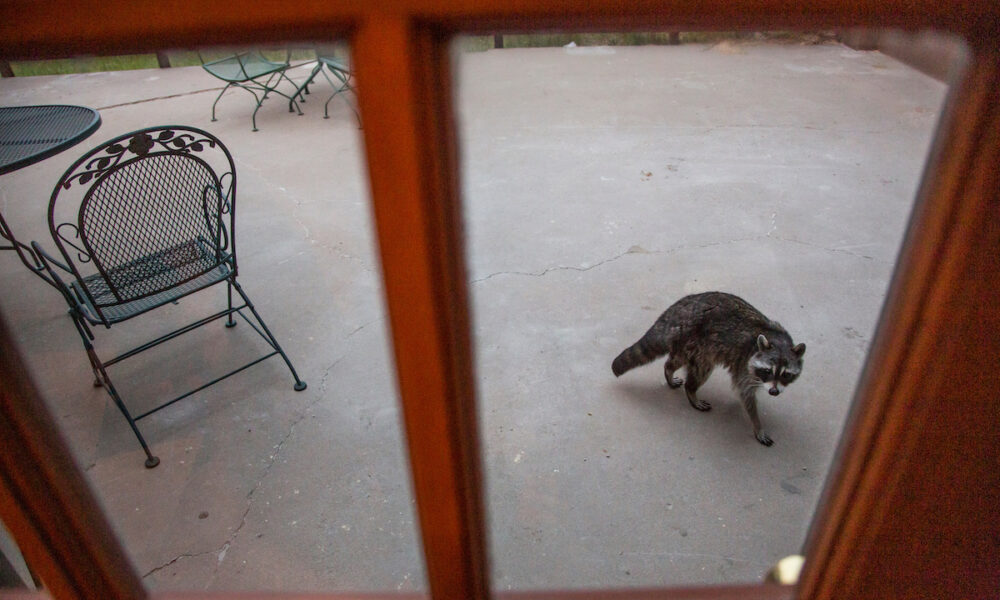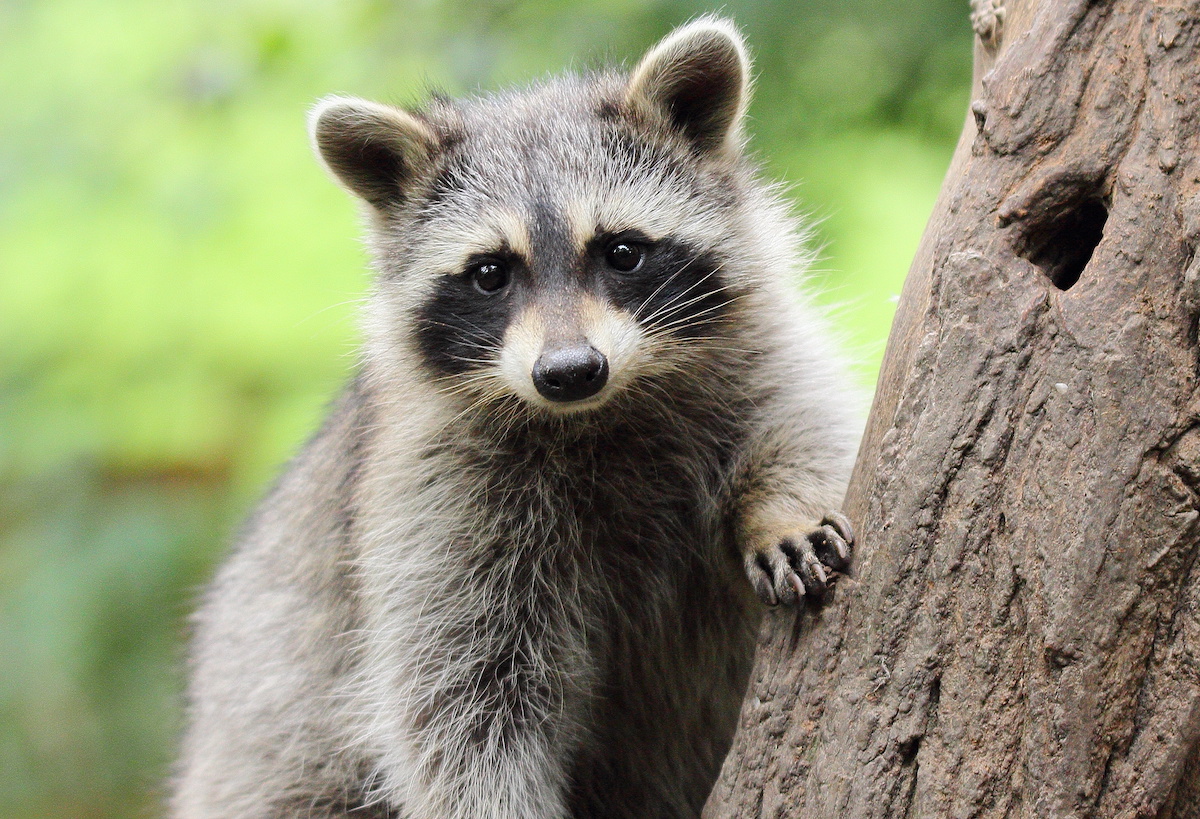
Do you hear bumping, scratching, and squeaking in the night? Dealing with raccoons in Florida homes can make your head spin. These clever, nocturnal creatures are not only adorable but also notorious for causing significant damage. Cute as they are, they’re also a nuisance. If you’re struggling with raccoon invasions in your home, it’s time to learn how to get rid of raccoons for good.
Understanding Raccoon Behavior
To effectively get rid of raccoons, the first step is to understand their behavior. If you could glimpse into the mind of a raccoon, here’s what you’d find:
Curiosity and Intelligence
These animals are naturally curious and intelligent, which often leads them to explore human habitats in search of food and shelter. One of the primary reasons raccoons are attracted to homes is the easy availability of food. They are known to rummage through garbage cans, compost bins, and even pet food bowls left outside. Their dexterous paws allow them to open lids, untie knots, and even manipulate door handles.
Born to Climb and Squeeze into Tight Spaces
Raccoons are also excellent climbers. This ability enables them to scale walls, trees, and downspouts, making them adept at entering homes through chimneys, vents, or any small openings they find. They can squeeze through surprisingly small spaces, sometimes as small as four inches in diameter, to access attics, garages, or crawl spaces.
Once inside, they may create nests. This leads to further problems like damage to insulation and wiring.
Creatures of the Night
Raccoons are famous for their nocturnal nature. They are most active at night, which is when they do most of their foraging and exploring. During these nocturnal adventures, raccoons can be quite destructive. They have a tendency to flip over garbage cans, destroy gardens, and even cause damage to roof shingles or siding while trying to gain entry into a home.

How to Get Rid of Raccoons in Your Florida Home
After your quick lesson about raccoon behavior, let’s talk about the signs of infestation along with how to get rid of them once and for all.
What are the Signs of a Racoon Infestation?
Do you know the signs of a raccoon infestation? Recognizing the signs of a raccoon infestation is crucial for timely and effective intervention. Raccoons leave several indicators of their presence, and being aware of these can help you detect an infestation early before it becomes a more significant problem. Here are key signs to look out for:
Noises at Night
Since raccoons are nocturnal, one of the earliest signs of their presence is the sound they make at night. You may hear scratching, thumping, or scurrying sounds in the attic, walls, or chimney. These noises are often more pronounced during their active hours, after sunset.
Damage to the Exterior of Your Home
Raccoons are strong and can cause noticeable damage as they attempt to enter your home. Look for torn roof shingles, damaged eaves, or holes in your vents. Raccoons can also damage the siding of your house or leave scratch marks on wooden structures.
Raccoon Tracks
Raccoon footprints are distinctive, resembling small human hands with five fingers. You might find these tracks in the soil around your home, in your garden, or even on dusty surfaces in your attic or garage.
Ransacked Garbage Cans
One of the most common and obvious signs of raccoon activity is disturbed garbage cans. Raccoons aren’t shy when knocking over trash bins to access food, often leaving a mess of garbage spread across the area.
Foul Odors
It’s true–raccoons don’t smell great. They leave behind a strong, musky odor. This smell can become much worse if they decide to live in your home. Before long, you’ll find yourself asking “what’s that smell?”
What’s more unpleasant is the scent of their urine and feces, which they often leave in concentrated areas, can be quite strong.
Raccoon Droppings
Their droppings are another clear sign. Raccoon feces are usually about two to three inches long, dark in color, and have a strong odor. Be cautious, as their droppings can contain harmful parasites and bacteria.
Evidence of Nesting
In your garage space or other areas of your home, you may find nesting materials. Look for items like shredded insulation, paper, or leaves, which raccoons use to build a comfortable living space.
Damaged Gardens or Lawns
Raccoons often dig up lawns and gardens in search of insects or food. They may also damage corn stalks or other plants while foraging.
How to Get Rid of Raccoons: Secure Your Food Sources
The first step in deterring raccoons is to secure all food sources. Place garbage tight-fitting lids on garbage cans. Look for lids preferably made of a material that raccoons can’t chew through. If possible, store garbage cans in a locked area like a garage or shed until collection day. Also, avoid leaving pet food outside–that’s because it’s a significant attractant for raccoons.
Reinforce Entry Points
Inspect your home for potential entry points for raccoons. Look for loose vents, holes in your roof or siding, and unsecured chimney openings. Use sturdy materials like metal flashing or hardware cloth to reinforce these areas. Make sure that tree branches are trimmed back from your house, as raccoons can use them to access your roof.
Using Repellents and Deterrents
There are various repellents available in the market, ranging from natural solutions like ammonia and pepper sprays to ultrasonic devices. While these can be effective, they often need to be reapplied after rain or over time.
Physical deterrents like motion-activated lights or sprinklers can also help in keeping raccoons away from your property.
Consider Professional Removal
If raccoons have already established themselves in your home, it may be necessary to seek professional help. Wildlife control experts like World Class Wildlife can safely and humanely remove raccoons from your property. We can also provide additional advice and services to prevent future invasions.
Don’t Forget About Regular Maintenance and Vigilance
Regular maintenance of your property is crucial in keeping raccoons at bay. Keep your yard clean, manage your compost wisely, and regularly inspect your home for new potential entry points. Vigilance and prompt action when you notice signs of raccoons can prevent larger infestations.
Contact World Class Wildlife to Get Rid of Raccoons in Your Home
Don’t let wildlife infestations disrupt your peace of mind. Turn to World Class Wildlife, where we prioritize your safety and the well-being of the environment. Our team, skilled in non-poisonous, organic, and eco-friendly wildlife control methods, resolves your raccoon problems without the use of dangerous chemicals.
From rats to raccoons, we go beyond removal by itself. After addressing the infestation, we thoroughly sanitize the affected areas to ensure your space is clean and safe. Choose World Class Wildlife for a responsible, effective solution to your wildlife concerns. Contact us today to safeguard your home or business with our expert services.
